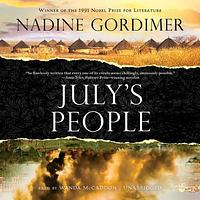Take a photo of a barcode or cover
emotional
reflective
fast-paced
Plot or Character Driven:
Character
Strong character development:
Complicated
Loveable characters:
No
Diverse cast of characters:
Yes
Flaws of characters a main focus:
Yes
Some great themes are explored here and will leave me pondering for a long time, but this short novella suffers from its cold, emotionless writing style.
One of my hand's down favorite bookstores is McNally Jackson. It is certainly my favorite bookstore to spend time in. The employees are so knowledgeable and passionate about books, and the environment is so inviting. I go in there, and I always get this palpable thrill, and this wonderful anxious desire to read all the books in the store. It's a little bit of heaven, one you have to visit if you are in NYC.
I mention McNally Jackson because they have a few ongoing book clubs, and the main book club, run by Ms. McNally herself, had this as their selection for April. I've been looking for ways to get out and meet new and interesting people, something that is difficult to do in the best of situations once you are a grownup but something that seems even more difficult in a city like NYC. People are friendly here, and you have lots of interesting and fabulous chance encounters, but they so rarely amount to more than a one-off conversation. I'm trying to get past that, hence the book club attendance.
I read this book not only because it was a book club selection. After all, I'm not one to follow the crowd except inasmuch as people who refuse to follow a crowd comprise their own crowd--a very large crowd in New York. I decided this would be a good month to attend because I'd never read Nadine Gordimer, and the book jacket had an interesting enough description. Besides, I do have a love of books about or set in Africa, especially about whites in Africa. I guess it's something to do with the tension of feeling like a place is your home but knowing in some fundamental ways that it's really not yours because it is something your ancestors have taken and stolen. There's a sense in which I feel a kind of kinship with white Africans of European descent. Their home, the only one they’ve known, is not really theirs; it’s the only place they belong but it’s a place they know they do not, in some very real ways, belong. Perhaps I am projecting, but it’s a feeling I’ve had, so I think that’s why I am fascinated. Their drama is mine on a much larger and more life-and-death scale, and I think that’s one of the reasons we read novels—to see ourselves and our lives reflected back at us in a way we can begin to make sense of.
This novel was one that I saw myself reflected in, quite frankly, in ways that were sometimes discomforting. In fact, discomfort was definitely the theme of the evening at the book discussion; this novel left very many people discomforted. It was described by one lovely woman as claustrophobic, and there’s something apt in that. However, the novel is also stunningly beautiful in its language and in its portrayal of people whose lives have been totally upended in such a way as to become unrecognizable.
The language, in fact, was one of the standout stars for me. It was sometimes melodic and poetic and other times jagged and broken. In a way that I think very much mimics poetry, Gordimer uses the words and syntax of the sentences themselves as reflections of the atmosphere and the characters’ feelings. The language is at the heart of the tension and claustrophobia, but it also brings into focus so much that is usually, as another attendee put it, at the periphery. There’s a tense scene late in the book, for example, where a woman is running through the bush, but instead of concentrating on her or her feelings, the author draws our attention to the details in nature. Furthermore, everything is so compressed, so succinct. More than once the author conveys big feelings, big ideas in very few words, and it isn’t just the word choice but the arrangement of the words that makes the language so powerful.
This is a short, beautiful, discomforting book. If that is something you can handle, this book is well worth your time.
I mention McNally Jackson because they have a few ongoing book clubs, and the main book club, run by Ms. McNally herself, had this as their selection for April. I've been looking for ways to get out and meet new and interesting people, something that is difficult to do in the best of situations once you are a grownup but something that seems even more difficult in a city like NYC. People are friendly here, and you have lots of interesting and fabulous chance encounters, but they so rarely amount to more than a one-off conversation. I'm trying to get past that, hence the book club attendance.
I read this book not only because it was a book club selection. After all, I'm not one to follow the crowd except inasmuch as people who refuse to follow a crowd comprise their own crowd--a very large crowd in New York. I decided this would be a good month to attend because I'd never read Nadine Gordimer, and the book jacket had an interesting enough description. Besides, I do have a love of books about or set in Africa, especially about whites in Africa. I guess it's something to do with the tension of feeling like a place is your home but knowing in some fundamental ways that it's really not yours because it is something your ancestors have taken and stolen. There's a sense in which I feel a kind of kinship with white Africans of European descent. Their home, the only one they’ve known, is not really theirs; it’s the only place they belong but it’s a place they know they do not, in some very real ways, belong. Perhaps I am projecting, but it’s a feeling I’ve had, so I think that’s why I am fascinated. Their drama is mine on a much larger and more life-and-death scale, and I think that’s one of the reasons we read novels—to see ourselves and our lives reflected back at us in a way we can begin to make sense of.
This novel was one that I saw myself reflected in, quite frankly, in ways that were sometimes discomforting. In fact, discomfort was definitely the theme of the evening at the book discussion; this novel left very many people discomforted. It was described by one lovely woman as claustrophobic, and there’s something apt in that. However, the novel is also stunningly beautiful in its language and in its portrayal of people whose lives have been totally upended in such a way as to become unrecognizable.
The language, in fact, was one of the standout stars for me. It was sometimes melodic and poetic and other times jagged and broken. In a way that I think very much mimics poetry, Gordimer uses the words and syntax of the sentences themselves as reflections of the atmosphere and the characters’ feelings. The language is at the heart of the tension and claustrophobia, but it also brings into focus so much that is usually, as another attendee put it, at the periphery. There’s a tense scene late in the book, for example, where a woman is running through the bush, but instead of concentrating on her or her feelings, the author draws our attention to the details in nature. Furthermore, everything is so compressed, so succinct. More than once the author conveys big feelings, big ideas in very few words, and it isn’t just the word choice but the arrangement of the words that makes the language so powerful.
This is a short, beautiful, discomforting book. If that is something you can handle, this book is well worth your time.
hopeful
inspiring
reflective
fast-paced
Plot or Character Driven:
Character
Strong character development:
Yes
Loveable characters:
Yes
Diverse cast of characters:
Yes
Flaws of characters a main focus:
Yes
While the political aspect and overall concept of this novel is nothing short of spectacular, Gordimer's writing becomes so thick that I felt like I was trudging through mud trying to get through this novel DESPITE the fact that it's in the present tense! The changes in the perspective and really well done though and there are some great lines in July's People. I think it just has to be your kind of writing for it to be the truly enjoyable experience I was looking for.
challenging
reflective
sad
tense
medium-paced
Plot or Character Driven:
A mix
Strong character development:
Complicated
Loveable characters:
Complicated
Diverse cast of characters:
Yes
Flaws of characters a main focus:
Yes
I'm feeling quite conflicted about this novel, because I truly enjoyed the story, but do not at all like Gordimer's writing style. It's extremely confusing at times as to who's talking, or about whom the narrator is talking. For now I'm rating it three stars, but I may change that later as I gather my thoughts.
3.5 stars. Found the writing style difficult at first; thoughtful depiction of interracial relations in South Africa. Written in 1981, over 10 years before the end of apartheid.
I was ready to give 3 stars and then things started to get really interesting in the last several chapters. Minus 1 star because things only start to get interesting in the last several chapters.





